 I’m out to write something fresh about Paris after going there with my wife for four days in July to visit my son who’s doing a summer semester in the city. (If you hear a whoosh, it could be the sound of a fool rushing in.)
I’m out to write something fresh about Paris after going there with my wife for four days in July to visit my son who’s doing a summer semester in the city. (If you hear a whoosh, it could be the sound of a fool rushing in.)
Grub first, then ethics-politics-art? Nah, but I’m way late to the moveable feast so I’ll start with dessert(s)…
I want another white gazelle cookie from the tea shop in the Grande Mosque. Pace Richard Goldstein, who steered us to the Mosque’s elegant tiles, domes, arches and flowery paths. (See above.) Not that he forgot the pastry. I’m sure my Muslim wife got more from the divine surround, but that post-prayer cookie on our first day in Paris got her open too…
I’m tempted to pray to/for Angelina’s Mont Blanc, which has been that famous shop’s signature pastry since 1903. Don’t be fooled by the caption for their concoction – “Crispy and dry French meringue under a smooth creamy dome of light whipped cream, covered by chestnut vermicelli.” – which seems a tad generic. (Though the add-on has more flair: “Its shape was apparently inspired by the trendy women’s hairstyle at the time: the sleek short square bob.”) Me and my wife and son took turns (scrupulously) as we broke down this sweet Alp in the Tuileries. For a couple minutes, neither the dreamy alabastrine ferris wheel nor grand lawns-and-ponds could deflect us from our mini-mountain of flavors. Angelina’s Mont Blanc is a peak experience (Sorry!) and an all-consuming one.
Crème Brulee at Le Petit Saint Benoit. My son’s friend, Chelsea, and I both ordered C.B. and felt like we’d been graced. It looks like crème brulee you might find in the U.S.A., but the taste has only the slightest relation to whatever egg-and-sugar sham we’d eaten back home.
I should go back to the start of our one mildly pricey French restaurant meal. A once-and-forever Parisian – Bless you Isabelle Cantor! – commended “reasonable” Saint Benoit for “the best foie gras in the world.” Judge not (as I’m not a kingly foodie), but the creamy F.G. was an ocean away from chopped liver (and I like chopped liver) or Zabar’s patés. Saint Benoit’s chow, though, was almost secondary to the charm of the patronne. He taught my kid how to eat escargots – use your fingers, son! He also saw my brownskin boy shares a neo-Cyrano nose with dad. Not the sort of noticing I’d expect in America where race tends to make a stranger blank to what’s in front of his/her schnoz.
The Jamaican-American jeune fille from Atlanta who had dinner with us brought local wisdom along with ready-for-the-worldliness to our table. As the blue hour came in with the entrees, we agreed to agree her hometown heroine, Stacey Abrams, is the sharpest pol in America (though we also held out hope for Beto). Chelsea is proud of her family and her people and her city but she allowed there’s no ATL equivalent to l’heure bleue…
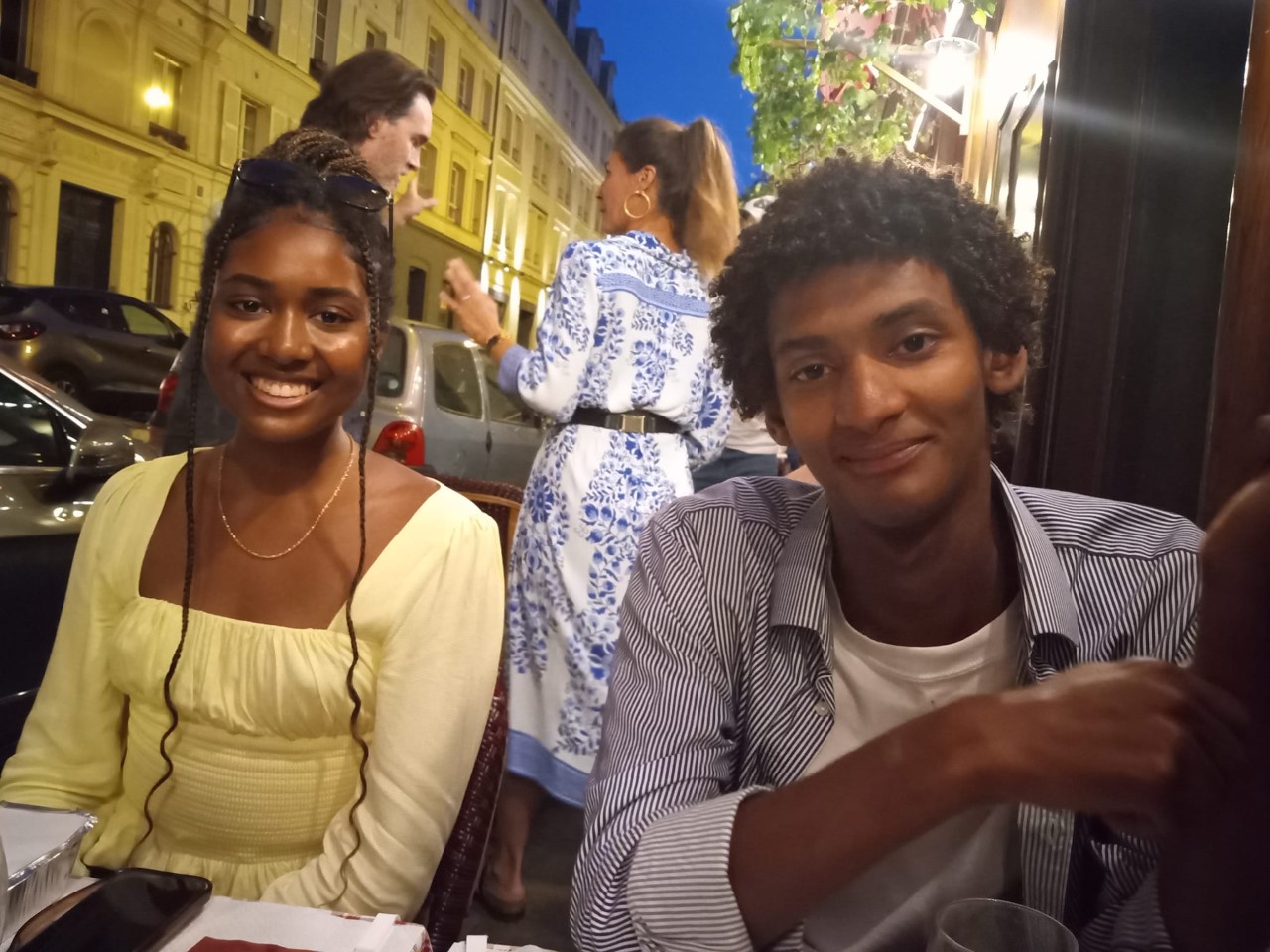
While Chelsea conceded she wasn’t lifted by Joe Biden, she distanced herself from purists who won’t face the numbers in Senate and House that make it hard for any Democrat to enact an agenda. Her sweet clarities, so far removed from the clean American left who contemn Biden, served as a kind of chaser to a talk we’d had earlier in the day with a Berber woman who ran a bookstore, Lady Long Salon, in the Bastille district that focused on the history of genocides and peoples’ struggles for self-determination. (On the real side, legalizing pot seemed part of Salon‘s program too.) Safia Lebdi shocked me in a good way when she affirmed Biden is “tres bien”! After all, Joe had made all the difference for Ukraine, whereas Macron had gone wobbly, sucking up to Putin and pushing Zelinsky to fold. It was bracing to hear her case for Biden, but she had so much more to give. I kissed her on the crown when she revealed she’d been on the Maidan in 2013-14. I was pushing my francophone wife for a simultaneous translation so I’m not sure if Safia L. was there making revolution or reporting on it. She edits a magazine called Guerre Moderne, which is a fount of humane internationalism. Guerre Moderne’s cri de coeur avoids mission statement prose. Per Google Translate: Modern War reports on the horrors of war against populations, but also on all the popular revolutions, movements and initiatives that are flourishing in the world. Because, come to think of it, in the end, through the chaos of History, there is only one positive actor, one hero, the people. Come to think of it, to come across this Berber editor – and hear echoes of Michelet! – in a bookstore down the block from where the people once stormed the Bastille got me higher than that Mont Blanc!
My kid has been reading an English translation of Michelet’s revel in the French Revolution. His copy, bought online, was once a library book and it kept setting off alarms at another book store, L’écume des pages (“The foam of pages”) near the heart of Paris’s most literary neighborhood. The clerk got a yuck at the idea of Michelet for Anglos and deeper laughs followed as my boy found the most recent volume of L’Arabe de La Future. An American citizen of the world – and tribune of anti-Islamism – Paul Berman had sent me to Foam and he had other useful advice on liquescence. Thanks to him, I tried brouilly (at a joint in the Bastille district). Cost me five or six euros for a glass of bliss. (It was a downer to find out a bottle over here runs around $40.) I’d set my sips on brouilly after seeing grapes about to blow inside Poussin’s tribute to Dionysus (and my favorite season) at the Louvre.
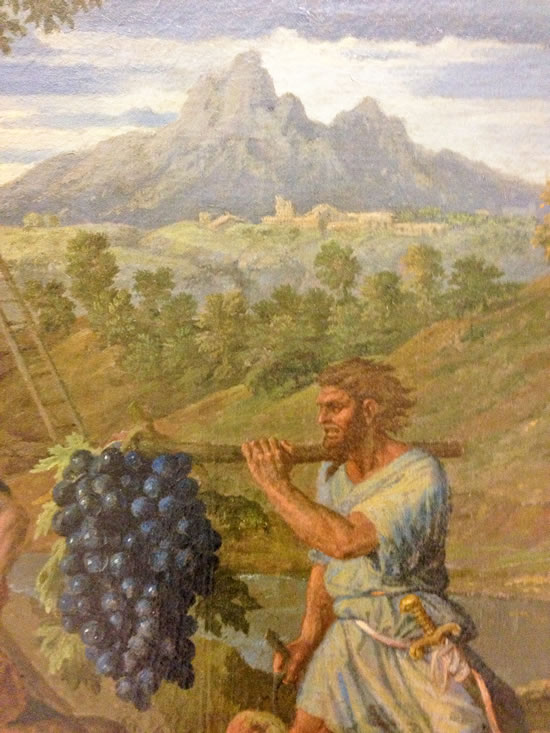
Detail from “Autumn” or “The Spies with the Grapes of the Promised Land,” Nicolas Poussin.
Berman might’ve enjoyed a rap with Safia Lebdi but Charles Keil seems like an even more natural respondent for this woman of the people. As a student of the genocide in Rwanda, she leaned in when I gave her a quick and dirty summary of Keil’s life and times. (See his poem in this First batch, “1954“.) I focused on how Keil’s Sixties experiences in Nigeria where he got hints of anti-Igbo pogroms that would lead to tribal Civil War, the Biafran genocide/famine and – in Keil’s view – the succession of mind-breaking massacres in the Motherland that Great Powers signed off on (or ignored) in the last half of the 20 C.
Charlie Keil, btw, hung out in Paris when he was nineteen. When he heard I was traveling there, he emailed me a link to a Parisian radio broadcast of him – with his band of buddies – playing drums behind Chet Baker.
Sixty years on, his personal history probably has more resonance than my currencies…
This is summer of 1959. I’m 19 and Swallow is probably still 18…We did some recordings that I have on LP with Gana M’Bow (sp.?) our first African drummer connection and peddler of weed to diplomats, or so he said.
Spent the summer of 1957 listening to Kenny Clark’s ride cymbal and brushwork on the “Walkin’” album. Got to play on it as we auditioned for the weekend with Chet, and that was my peak as a set player. An 18 inch HEAVY ride cymbal that sounded gongish up close but had great pinging sound 20 feet plus away.
I asked Charlie for more echoes from his past…
The rhythm section of our “summer” band (can’t remember the name of it right this minute) went to Paris to camp out in the studio of the Notre Dame organist, friend of the clarinet player’s family. We went to the Blue Note to hear Kenny Clark, Pierre Michelot (bass), and Rene Utreger (sp?) piano, with Chet Baker. And that rhythm section had “double booked itself” – needed some subs for two nights so we sat in for a few tunes, Chet was satisfied, so we got the gig and the radio appearance was arranged by the Blue Note management. Just before we took the Dutch boat home someone asked me to be the drummer for Bud Powell at Chat que Peche (the Cat who Fishes(?)) but I wanted to finish college. So I think this was the high point of my jazz drumming career around my 20th birthday.
My ears were up when I was in Paris and it was fun to hear street-jazz in St. Germaine de Pres or the francophone voice of Afropean singer Aya Nakamura floating in the air on a random avenue. I’ll allow, though, I came to Paris with a soundtrack in my head. I took the title of this piece from Mark Helprin’s 2017 novel, which I read after I learned Ben Khadim would be heading for Paris. The hero is a cellist and a bright Bach piece gives the book its leitmotif.
“Sei Lob und Preis mit Ehren“ translates as “Thou people, praise god’s love.” I’ve made the Bach piece over into my praise-song for Paris. Not that I had do much work there. Helprin’s novel is suffused with his love for the city. He lived there when he was an infant and it was the place where he entered the world/culture. Which may explain why he’s a paleo-conservative when it comes to American politics and culture. (Helprin scripted one of the worst fails in the history of Convention Acceptance speeches, when he had Bob Dole offer to become a “bridge to the past” in 1996, which gave Clinton’s boys a chance to pitch the Man from Hope as a “bridge to the 21st Century.”) Paris in the Present Tense‘s plot bodies forth Helprin’s angst about the state of Europa in this century. His hero intervenes when he sees three Arabs beating up a Jewish guy on a Paris bridge. Helprin’s fictional alter-ego ends up killing two of the bullies and when he chooses to avoid justifying his behavior to Authorities, the book turns into an odd hybrid of policier, May-December romance, and Condition-of-France novel. Helprin’s cellist-tough guy is a little too perfect for this world. Three beautiful women fall in love with him on first or second sight in the course of the novel and Helprin seems to think that’s not a stretch since his killer-string player falls fast too. (His susceptibility had a reviewer quoting Raymond Chandler: “This guy’s easier to get than a haircut.”) But Helprin’s Great Fear isn’t irreal. He’s right to worry there’s one venerable French trad, Jew-hatred, that might align French Reaction with Islamism. No doubt he’d be alive to implications of inscriptions on Dreyfus’s tomb in Montparnasse Cemetery, which spell out the link between the officer’s excruciation and the Final Solution. It’s close like that Over There.
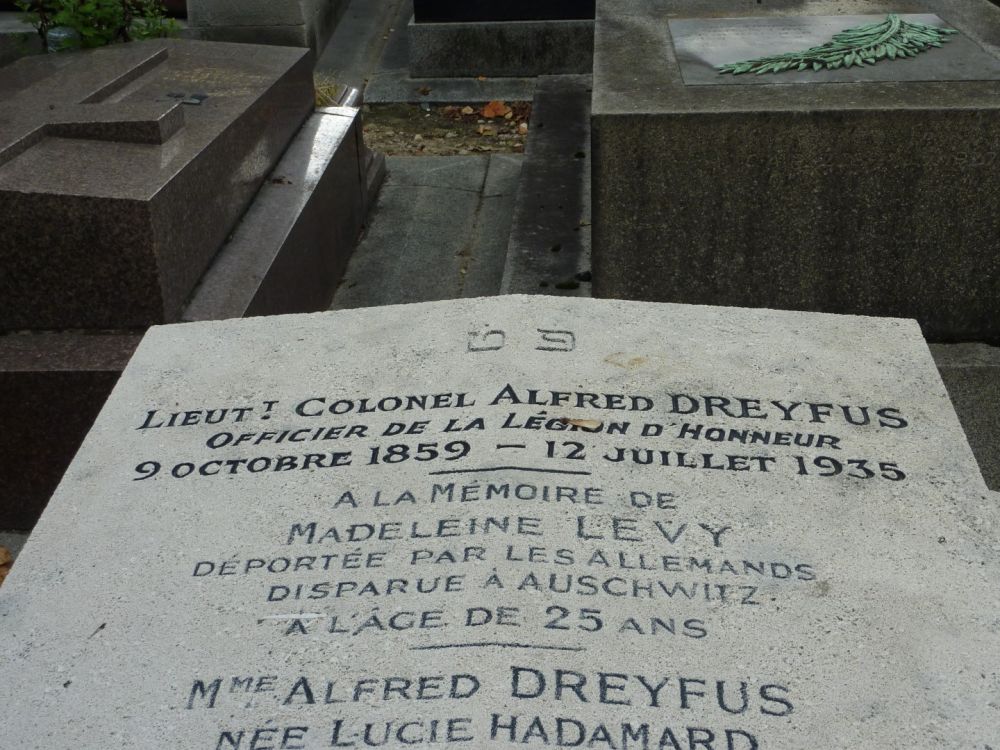
My son not only pointed me to Dreyfus’ tomb but also guided us lightly through the Pompidou Center’s large exhibit of German art from the late 20s tuned to photographer August Sander’s grand survey, Citizens of the 20th century. (“This multidisciplinary exhibition is structured into eight thematic sections corresponding to the groups and sociocultural categories created by August Sander.”) The Center’s review of bohemian anti-Semitism—as well as the regular old German kind—hinted Sander’s humanism might’ve been dicey due to his categorical imperative, though his respectful portraits of Jews make it clear he was anything but a proto-fascist. The exhibit finished with Sander’s late photos of a “nice” SS man, a more obviously brutish one, and the death mask of Sanders’ son—a socialist who died in a Nazi prison. The astute survey made me think Helprin may be too doomy about Parisians’ capacity to take in the past. I’m reminded just now of the teenage worker wearing a yarmulke at a Tunisian take-out spot (where we ate good sandwiches and got treated like homies, with freebie sodas from the Levant and hot “Tunisian donuts”). That shop is on a side street in the Marais—the “Jewish” arrondissement. Per Helprin, Jews are leaving Paris in droves due to the threat from Islamists and Deep France’s neo-nazis. So it’s good to know “Oriental” Jews are taking their stand, not too far from the Pompidou Center’s knowing survey of Sander’s stubborn humanism (and iffy a prioris).
My son proved to be a fine museum guide. At the Louvre, Ben Khadim zeroed in on details—those kids underfoot in David’s The Intervention of the Sabine Women—I’d’ve passed right by and he had us skip the mass crush around Mona Lisa. I’m glad, though, we braved the crowd of cell phone shooters in front of Musée d’Orsay’s Starry Night Over the Rhone. I wouldn’t be surprised if I end up flashing on Van Gogh’s Rhone whenever I see lights up the river. D’Orsay’s Courbets are eye-changing too. Once you’ve come near his (of the people, by the people, for the people) art – what comes after seems a little tame. Though not even the most Gustaveous Courbets rock and roll away the Louvre’s Poussins. We found a room of his landscapes, with no-one but us looking to get lost in his country.
I locked on Landscape with Diogenes, which limns the anti-acquisitive side of classical philosophy. Having seen a man drinking water from a stream by cupping his hands, the Greek hero throws away the cup that’s his last material possession.
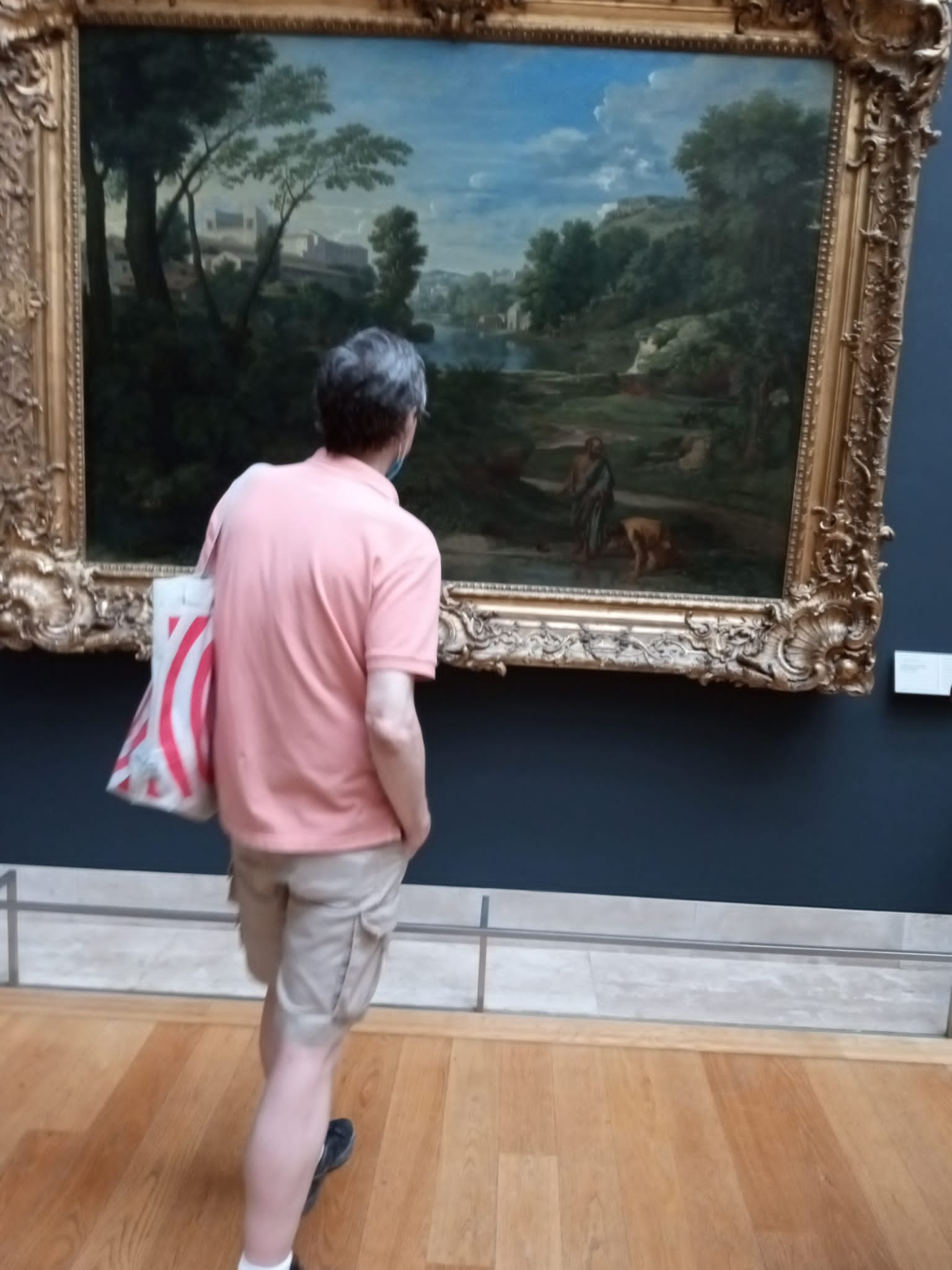
The present alone is his promesse de bonheur and the dense but inviting forest will provide. I’ve learned since that Turner and Wordsworth were fanboys of Landscape with Diogenes. Willie the Kid, though, lost me when he implied he always knew exactly what time it was in Poussin’s landscapes. FWIW, I can never tell if Poussin’s washed out blue skies signify dawn or dusk. It’s his world and it runs on Poussin time!
There’s so much to clock in this landscapes. I’m reminded of a late friend – an art critic – who mused about sitting with a Rothko for forty minutes. I’ve got no problem with abstraction, but it’s easier for me to imagine minutes turning into an hour under the spell of a Poussin.
Invitations in his landscapes in the Louvre parallelize prospects of walkers in Paris. Nothing could be more inviting to a young eye than the city’s grand avenues and backstreets, noble squares and culverts, bridges and balconies and public gardens…
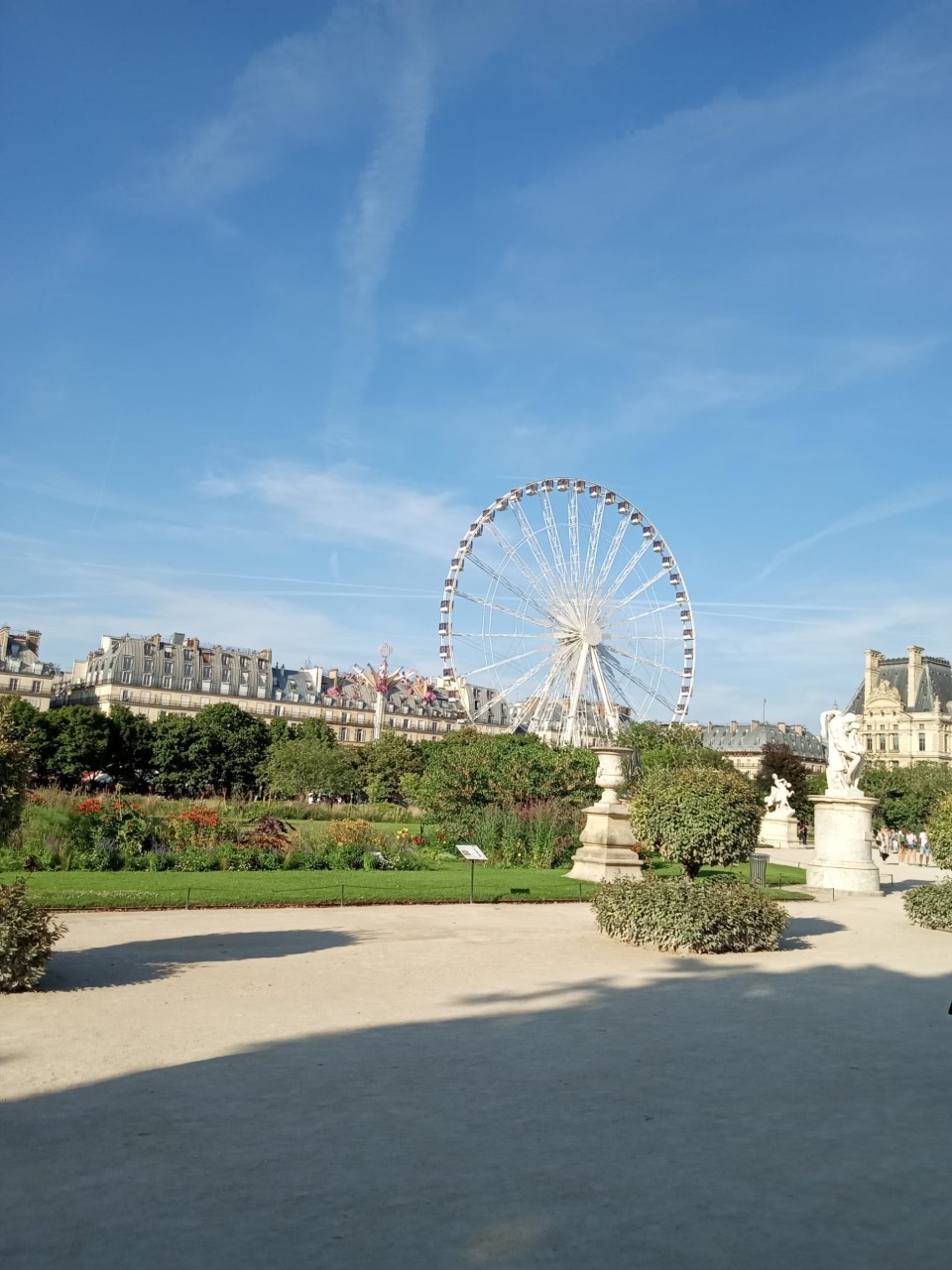
You can even find your own private gardens. We came upon this one off to the side of Place Vendome…
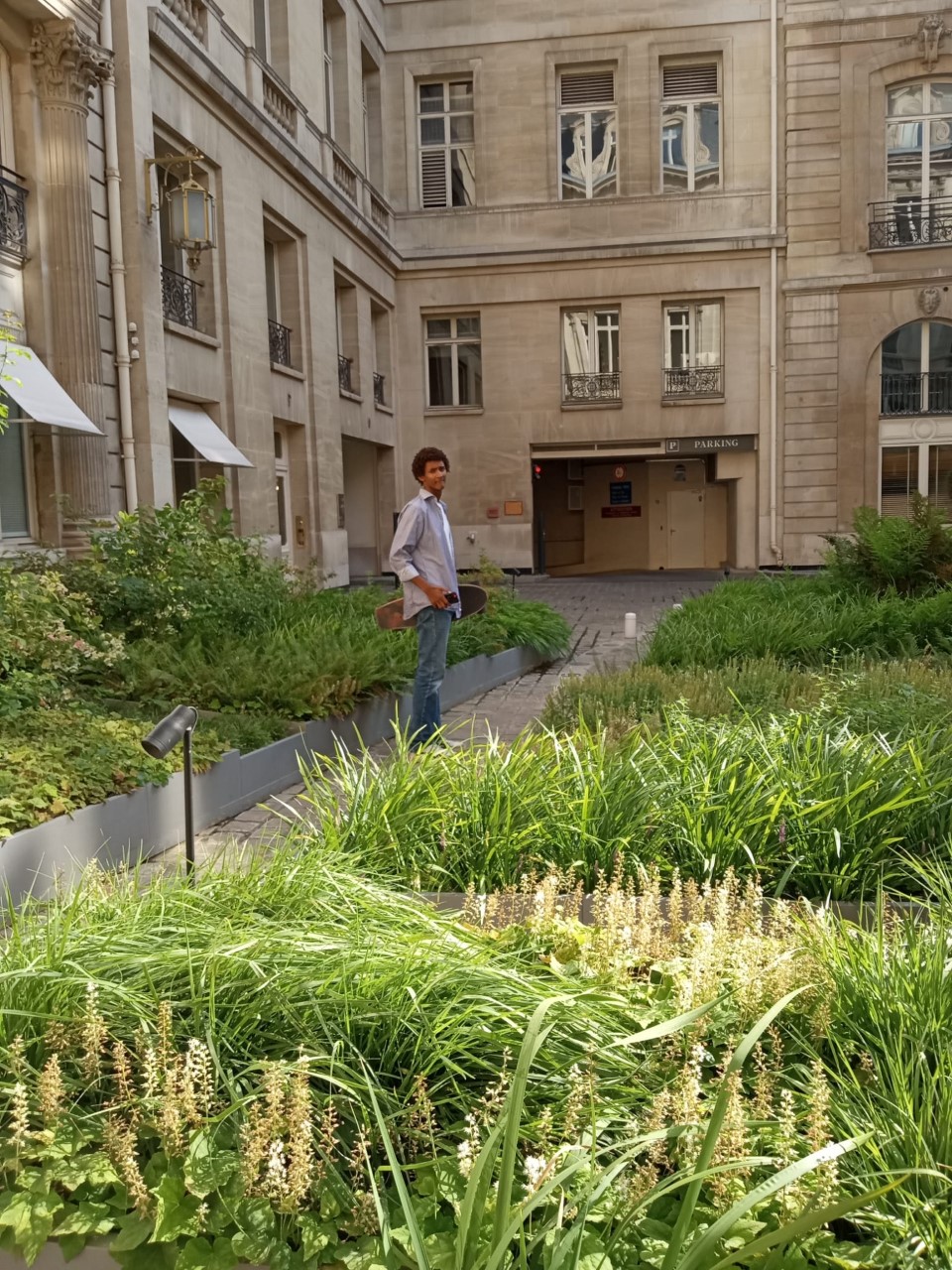
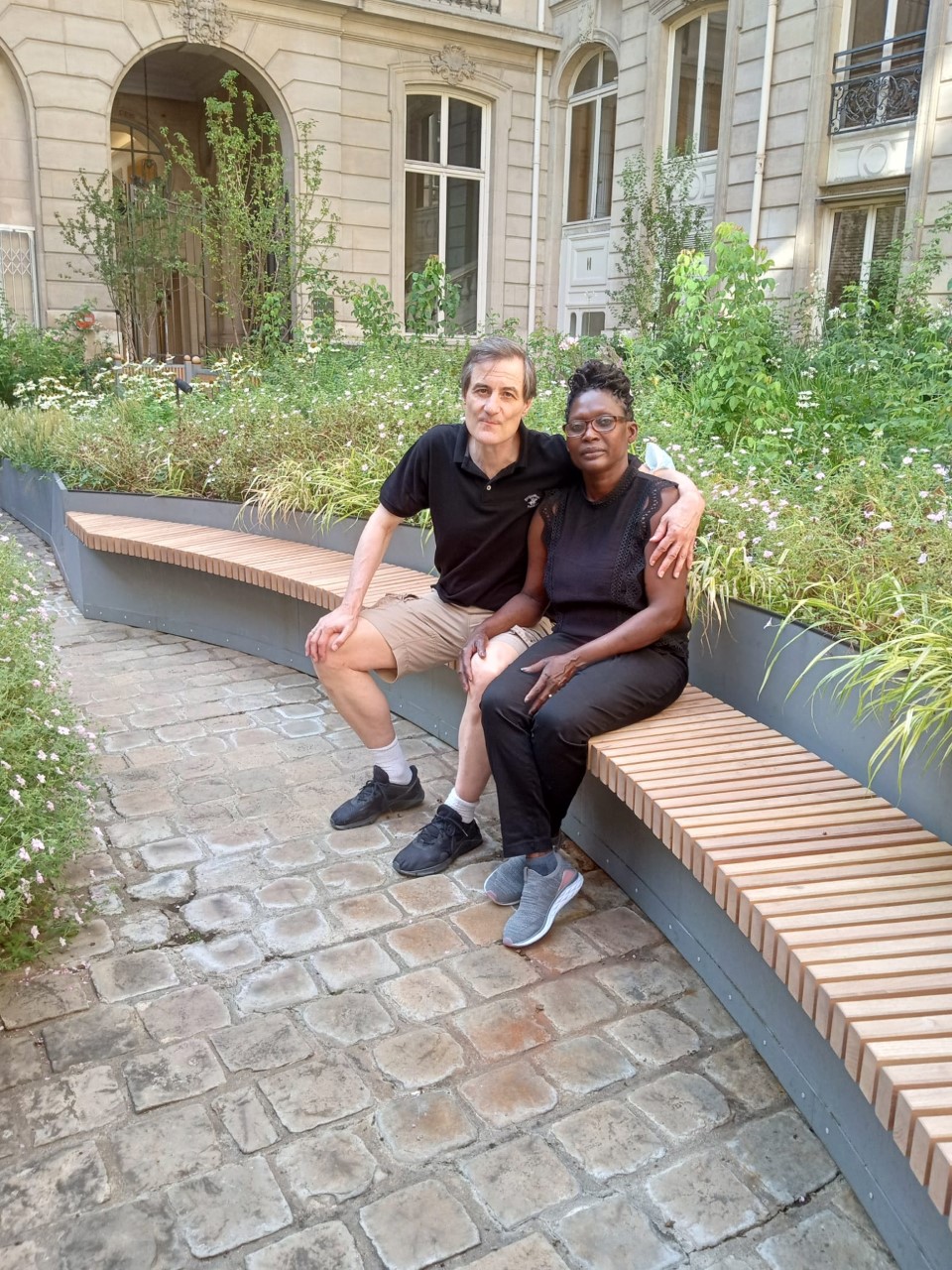
My son helped us find our way around the city. When he wasn’t with us, though, we were at the mercy of Parisians since my wife couldn’t suss Google maps on her new phone and I don’t carry one. We ran into a schmuck of a douane at the airport on Day One and a prickly cabbie on our way out of the city, but, in between, we had dozens and dozens of encounters with Parisians of every kind and condition and color. They were unfailingly kind and generous to us. How did they get such a bad rep??
My Senegalese wife came to Paris with a bias against the French (due to their history of colonialism). But the city and citoyens wore down her defensiveness. Until, on her last night, Satori in Paris. In a store buying a soda after midnight, I overheard her banter with an Algerian fruit vendor and his charming daughter as they offered her a free peach. My Mbayang is a much better giver than taker. Her own girlhood as a dutiful daughter under heavy manners in a society shaped by the reality of scarcity has made her wary of gifts that might come with obligations. But that little girl was irresistible: “Vous ne devez pas refuser notre cadeau.”
My wife took it beautifully. And when we got back to our hotel, she bit the cadeau. It proved to be the peach of all peaches—best she’d ever had. She came back from Paris with a new appetite for city life. A day or two after our return, she found a good gelato spot—Berthillon’s sorbets on Ilé de la Cité were in her mind—and came home with delicious small plums from a farmer’s market. Instead of going down into the subway, she’d taken a bus that rolled up Riverside Drive from 72nd St. as she gazed out the window, seeing her own island with new eyes.
My last French lesson came in the hour before we split for the airport. I went around the corner from our hotel to Montparnasse Cemetery with my son (who may skateboard back to check on graves of his favorite Directors—Varda, Pialat, Rohmer…). He guided me to where Sartre is buried with Castor. (Those are train tickets weighted down on their tomb.)
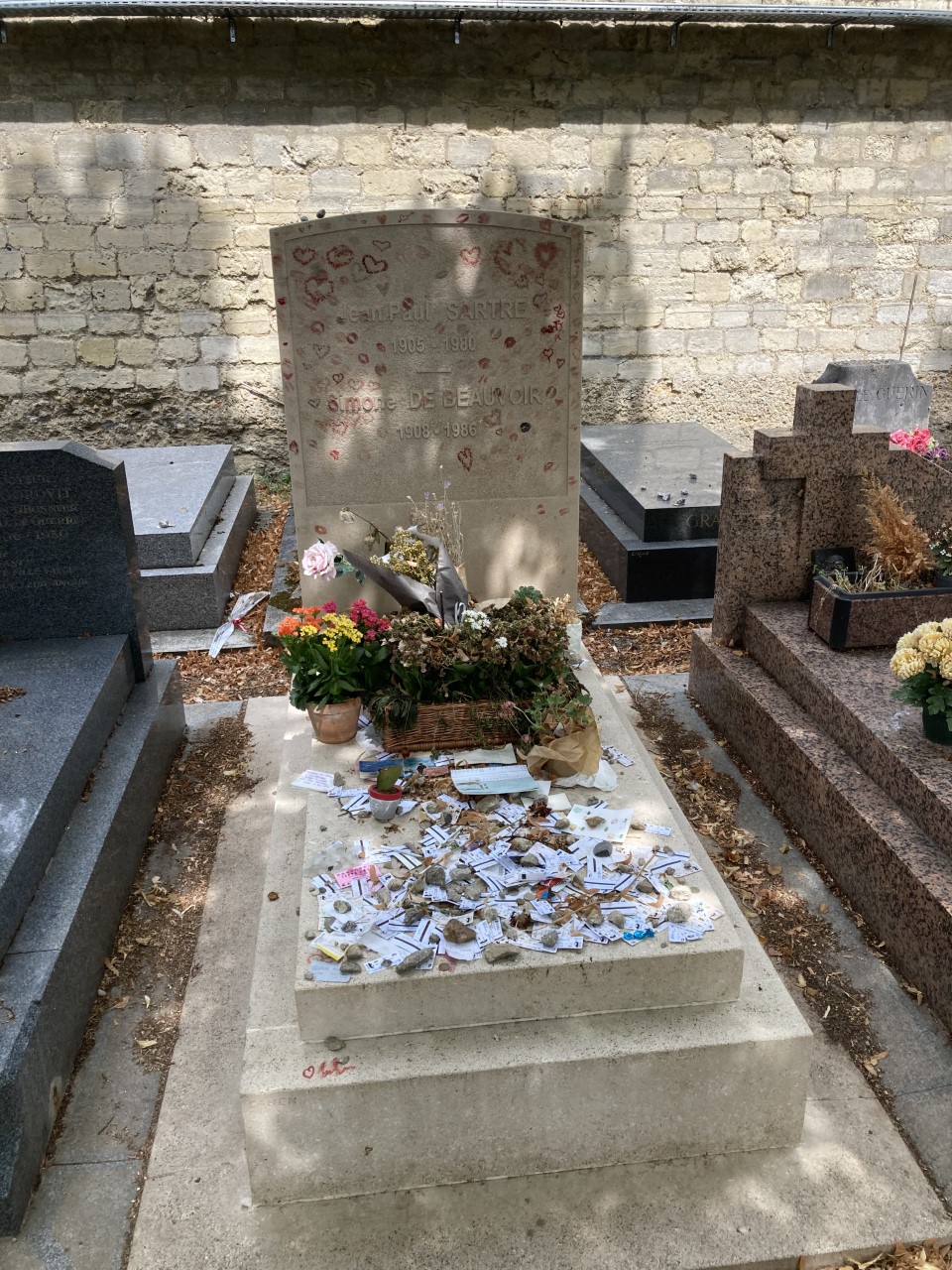
I hadn’t thought much about Sartre for decades, though he was my conductor when I was a teenager. Memories of how his work got me going came back unbidden when I saw the tomb. Back home in the USA, I found a PDF of The Words online. (Who’d I give my copy too? And where’s that beat up black book, The Philosophy of Jean-Paul Sartre, edited by Robert DeNoon Cumming? Or the paperbacks from Roads to Freedom?) The Words’ version of a bourgie, bookish boy’s life still sings for me. And the ender nails the upshot of my own wordy rappinghood…
What I like about my madness is that it has protected me from the very beginning against the charms of the “elite”: never have I thought that I was the happy possessor of a “talent”; my sole concern has been to save myself—nothing in my hands, nothing up my sleeve—by work and faith. As a result, my pure choice did not raise me above anyone. Without equipment, without tools, I set all of me to work in order to save all of me. If I relegate impossible Salvation to the prop-room, what remains? A whole man, composed of all men and as good as all of them and no better than any.
Postscript: Sartre should have the last word from Paris, but I bet he’d want me to say NO to a movie I saw on the plane home so…
Wes Anderson’s New Yorker-obsessed French Dispatch is all signature. (As ever? Not quite, he’s made movies where he seemed to know the tree of twee isn’t the tree of life.) I was put off this time around by his equation of Paree with Ennui. (He’s no Baudelaire so he’s not getting away with his spin on spleen.) His flic’s cool mockery of Parisians and Kansans didn’t seem to chime with his choice to live as an exile in Montparnasse. He’s confessed to being captivated by Paris, yet French Dispatch lacks frisson. Anderson’s content to serve up droplets of feeling, which seemed truly paltry when I watched a second, better movie, Blue Bayou, as I crossed the Atlantic.
Set in New Orleans, Blue Bayou is based on true stories of adoptees from foreign countries (with estranged American parents) who are at risk of being deported due to a gross glitch in U.S. immigration law. The Indy auteur behind Blue Bayou, Justin Chon, who also plays the lead (winningly), has made a movie with the force of reality. By contrast, French Dispatch seems like a trivial tease. Blue Bayou is a work of people’s art with a large takeaway—a son of Koreatown has more to offer Americans than a preppie offspring of New Yorker-reading sophisticates. Chon’s character in Blue Bayou drops one of the most patriotic lines in recent cinema after he’s forced back into NOLA’s illegal economy to pay for an immigration attorney. He’s hanging tight while a multi-culti crew of thieves prep to break into a showroom of pricey motorcycles. “Motherfuckers” are flying as amped up lumpen rant about how they’ll use money from their score to visit the pyramids or vacation with mai tais and girls gone wild. Right before they smash windows, one of the gang focuses in on Chon: “Where would you go?” He infuses his reply with more feeling than Anderson’s toney cast of 4th Wall climbers put into any of the French Dispatch’s comebacks.
“I’d stay the fuck right here.”
(An odd line to end an ode to Paris? What the hey, New Orleans isn’t too far gone from the city of light.)